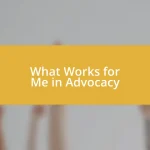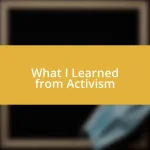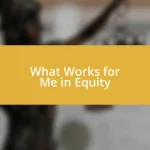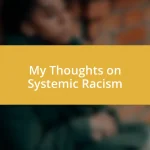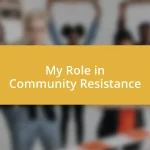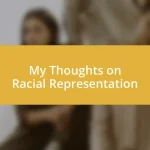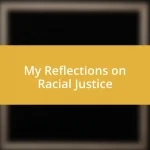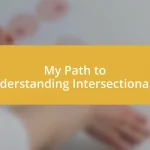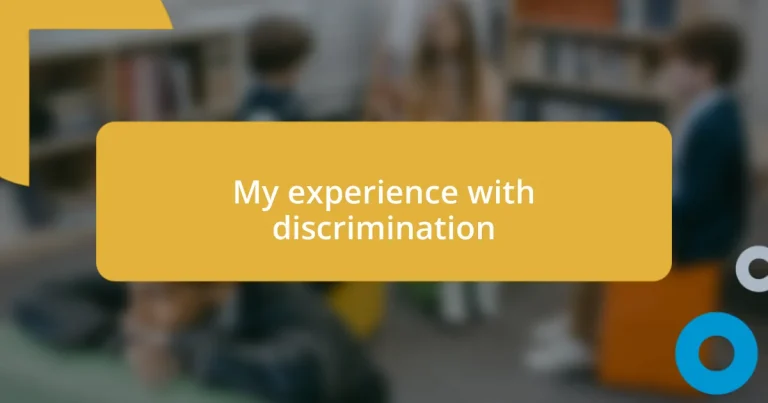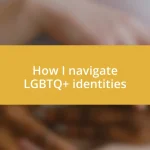Key takeaways:
- Discrimination is often subtle, manifesting in behaviors and comments that can deeply affect an individual’s sense of worth and belonging.
- Personal experiences of discrimination highlight the importance of speaking up and creating inclusive environments where everyone feels valued.
- Coping strategies such as seeking support, engaging in creative expression, and practicing self-care are vital for individuals facing discrimination.
- Advocacy, community support, and proactive initiatives can foster positive change and promote a more inclusive society.
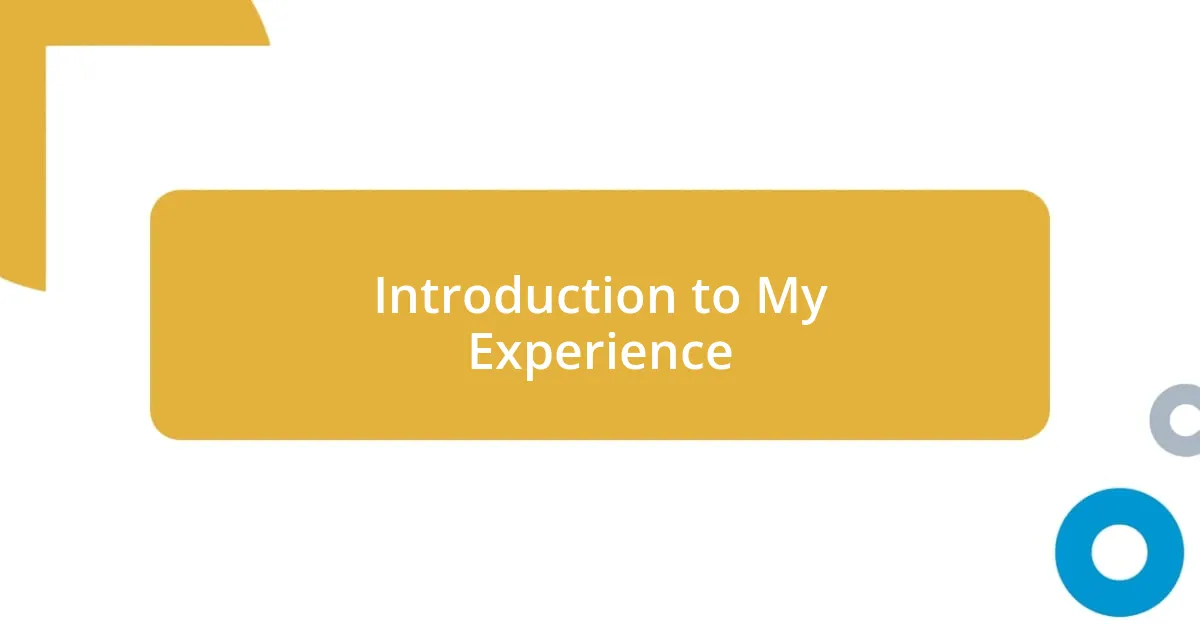
Introduction to My Experience
When I reflect on my experiences with discrimination, I often find myself puzzled by how deeply these encounters have shaped my identity. There was a particular moment when I realized the disparity in how I was treated compared to my peers. That day in the workplace, when I overheard my contributions dismissed simply because of my background, I felt a wave of helplessness wash over me.
I remember the palpable tension in the air during that meeting. My heart raced, and I questioned whether I was truly valued for my talents and insights. Did they even see me as a person or merely as a label? It’s staggering to think how moments like these can linger in your mind, affecting your confidence and sense of belonging.
The isolation I felt was both profound and eye-opening, leading me on a journey of self-discovery and resilience. Sometimes, I wonder, how many others share similar stories? This reflection sparked my determination to not just endure, but to rise above, using my experiences to advocate for change and understanding.
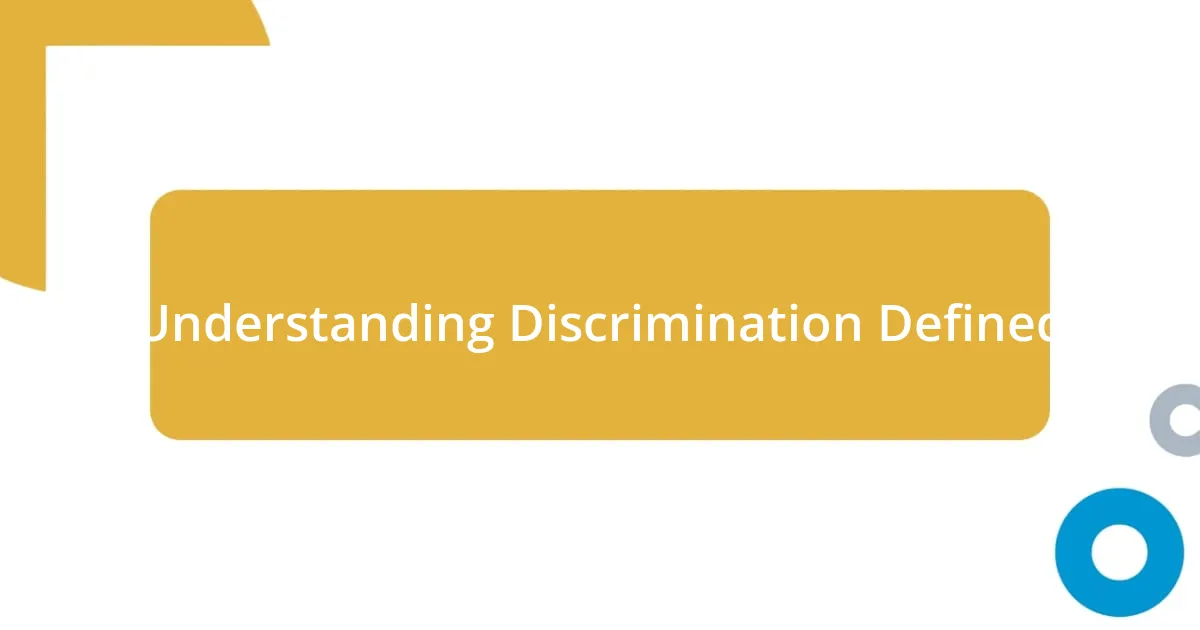
Understanding Discrimination Defined
Discrimination can be understood as the unfair treatment of individuals based on characteristics like race, gender, age, or disability. In my experience, I’ve noticed that these biases often manifest subtly, sometimes in behaviors or comments that seem innocuous at first but cut deep. For example, I recall a comment made during a casual team lunch that belittled an accomplishment of mine—wrapped in a joke but stinging all the same.
- Discrimination affects various aspects of life, including employment, education, and social interactions.
- It can be systemic, reflecting broader societal issues, or personal, arising from individual biases.
- Many people who experience discrimination often feel a sense of isolation, leading to internal struggles with self-worth.
Understanding these nuances is crucial. I remember feeling a sinking sensation during an important presentation when a colleague casually referred to me as “the diversity hire.” Such labels can diminish genuine achievements, making it hard to separate one’s capabilities from societal stereotypes. Recognizing and addressing discrimination is pivotal for fostering a more inclusive environment.
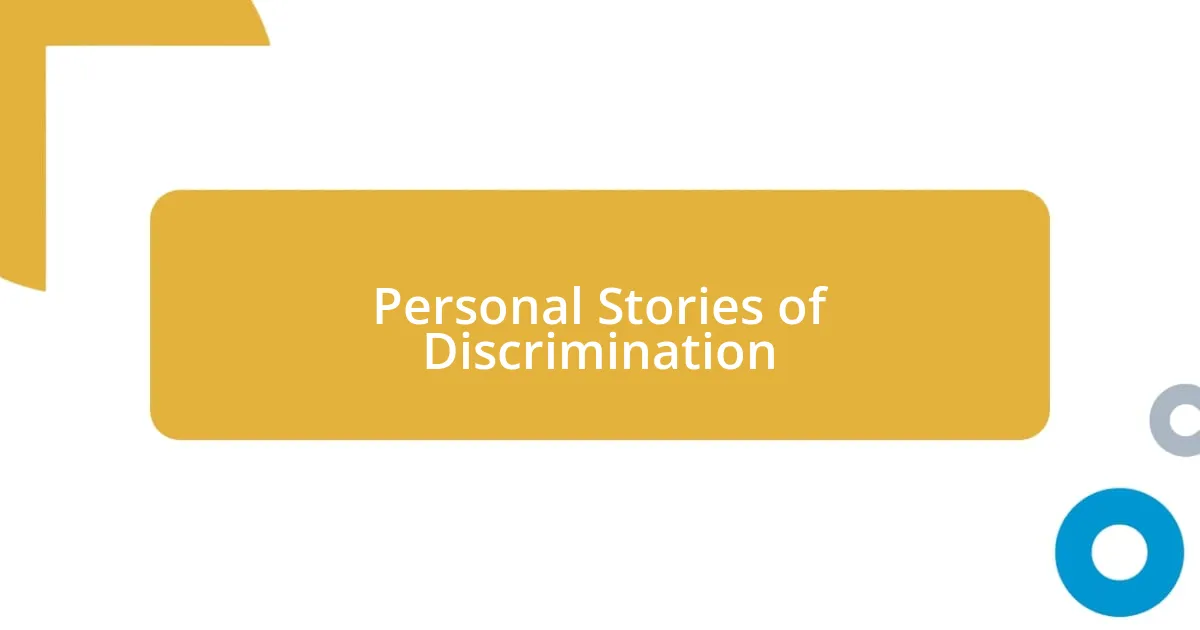
Personal Stories of Discrimination
One time, as I walked into a restaurant with friends, I felt the eyes of other patrons on us. It wasn’t just their curious glances; it was the way they subtly shifted in their seats. This moment struck me hard. Why was I made to feel like a stranger in a space that should feel welcoming? Unfortunately, these experiences aren’t isolated. They echo the societal biases that shape the world around us.
Another incident comes to mind from my college days. While working on a group project, I noticed my contributions often ignored, overshadowed by louder voices. My frustration grew as I watched my ideas dismissed, yet the same suggestions were celebrated when echoed by others. It’s disheartening to see talent held back by prejudice when all I wanted was to make a positive impact within my group.
Reflecting on these stories reminds me of the power of recognition and support. I’ve learned that speaking up not only empowers me, but can also inspire others feeling similarly alienated. It’s essential to create spaces where everyone feels seen and appreciated, rather than reduced to their backgrounds.
| Personal Experience | Impact on Self |
|---|---|
| Restaurant Incident | Felt unwelcome and judged |
| College Group Project | Frustration from being ignored |
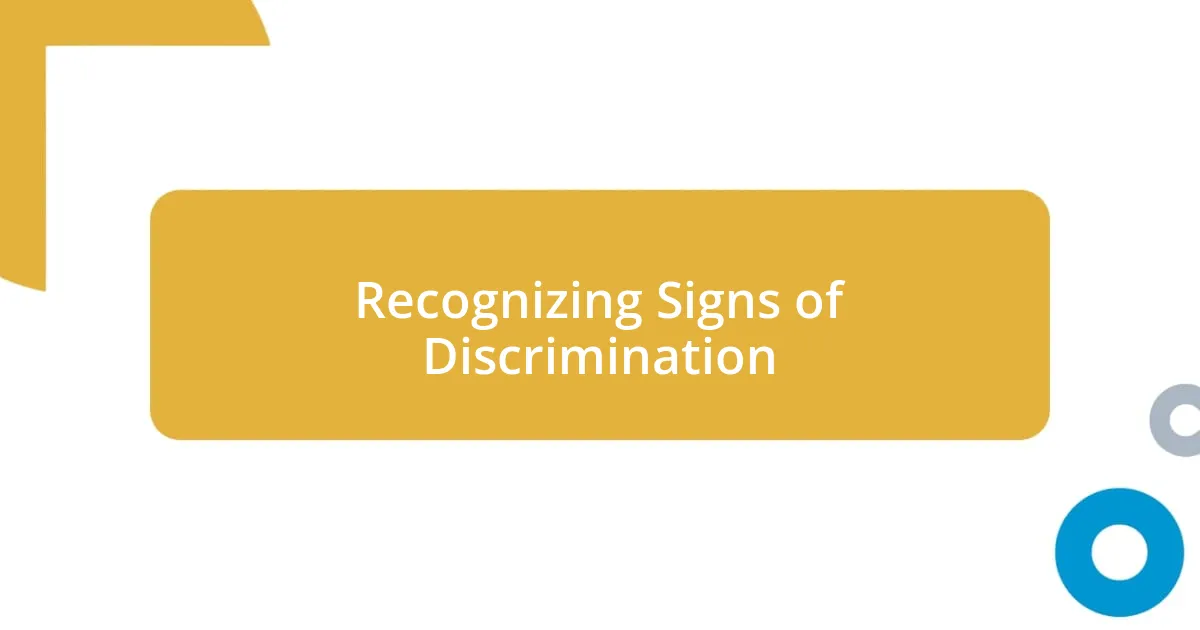
Recognizing Signs of Discrimination
Recognizing signs of discrimination often starts with noticing subtle behaviors and attitudes that may seem insignificant initially. I remember being at a networking event where I overheard a colleague expressing disbelief that I was the lead on a project. The disbelief wasn’t about the project itself but about my ability to handle it—something that stuck with me and made me question my own competence. How many times do we brush off comments like these, thinking they’re just misunderstandings?
Another telling sign can be exclusion from conversations or opportunities based on one’s identity. One vivid experience for me was during a team brainstorming session; despite having good ideas, I found that my contributions were often overlooked in favor of more vocal team members. I couldn’t help but wonder if those moments of silence were about my ideas or my background. It’s a harsh realization that being unheard can stem from biases masked as preference.
Emotional responses can also reveal darker undertones of discrimination. There was a time when I attended a social event in my community, and I noticed the immediate shifts in attention when I spoke. A once lively conversation would turn stilted, as if my presence altered the atmosphere. It left me feeling not just unwelcome but invisible. It’s this kind of recognition that invites us to reflect: What is it that makes us easy to dismiss?
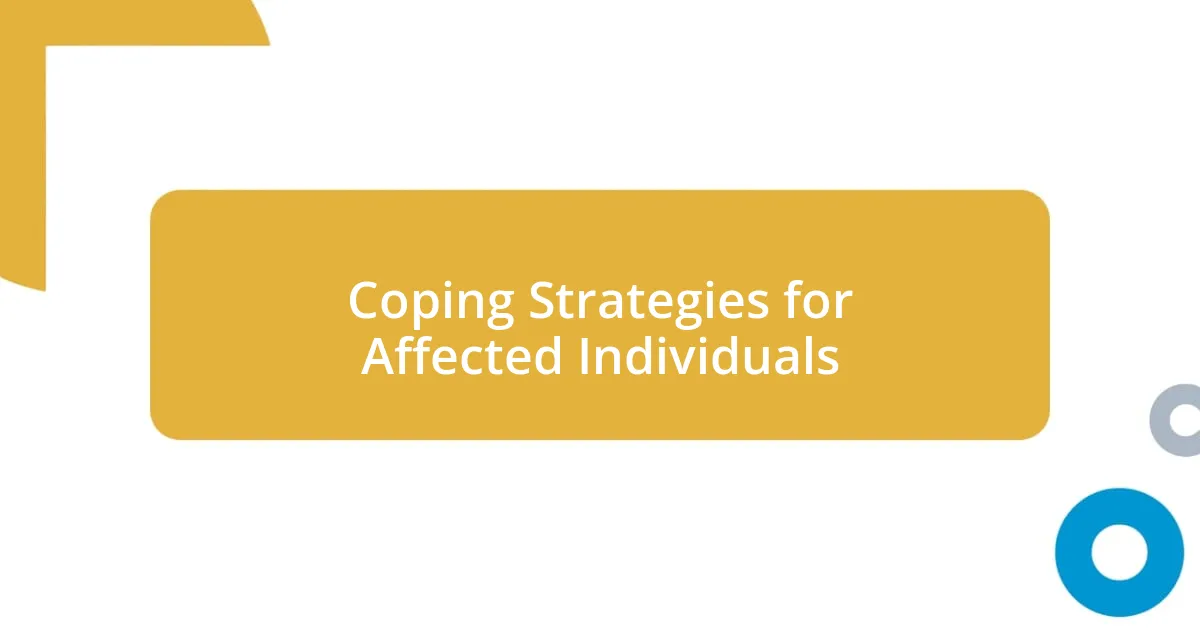
Coping Strategies for Affected Individuals
Finding healthy coping strategies is essential for anyone affected by discrimination. One method that resonates deeply with me is seeking support from friends or trusted individuals. I remember confiding in a close friend after a particularly dismissive experience at work. Their understanding validated my feelings, reminding me that I wasn’t alone in facing these challenges. Isn’t it comforting to know that just sharing your struggles can lighten the load?
Another effective strategy is channeling your emotions into creativity or activism. I found that writing about my experiences allowed me to process my feelings and even create change. Whether through blogs, art, or community involvement, expressing oneself can transform hurt into a powerful narrative. Have you ever thought about how your experiences could inspire others?
Finally, practice self-care and mindfulness. I’ve learned that taking time for myself, even if it’s just a brief walk or meditation, helps to reclaim my sense of peace after facing discrimination. It’s easy to get caught up in the negativity, but how can we nurture our well-being in those hard moments? Finding joy in small things can be an empowering step toward resilience.
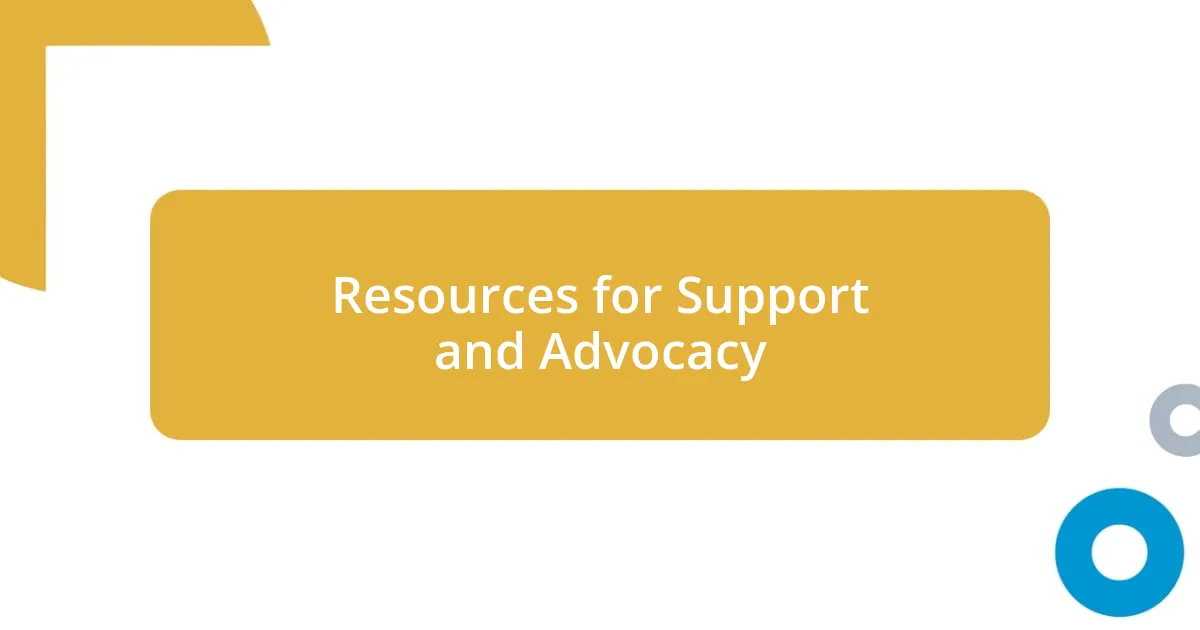
Resources for Support and Advocacy
When it comes to finding resources for support and advocacy, community organizations can be invaluable. I recall a time when I felt overwhelmed and unsure of where to turn after a negative experience at work. I reached out to a local advocacy group that provides counseling and informative workshops on discrimination. Their guidance not only equipped me with practical strategies but also helped restore my faith that change is possible. Have you explored similar avenues in your own community?
Another valuable resource is online support groups and forums. I remember joining one that focused on professional discrimination, where I connected with individuals from diverse backgrounds sharing their stories. Hearing others’ experiences not only helped me feel less isolated but also taught me different approaches to combatting discrimination. Isn’t it reassuring to realize there’s a whole network of people ready to lift you up?
Legal resources also play a pivotal role in advocacy. During a challenging time, I consulted with a legal aid organization that specializes in discrimination cases. They walked me through my rights and options, empowering me to take action. Knowing I had expert support made a world of difference. Have you considered what steps you can take to advocate for yourself and others, armed with the right knowledge?
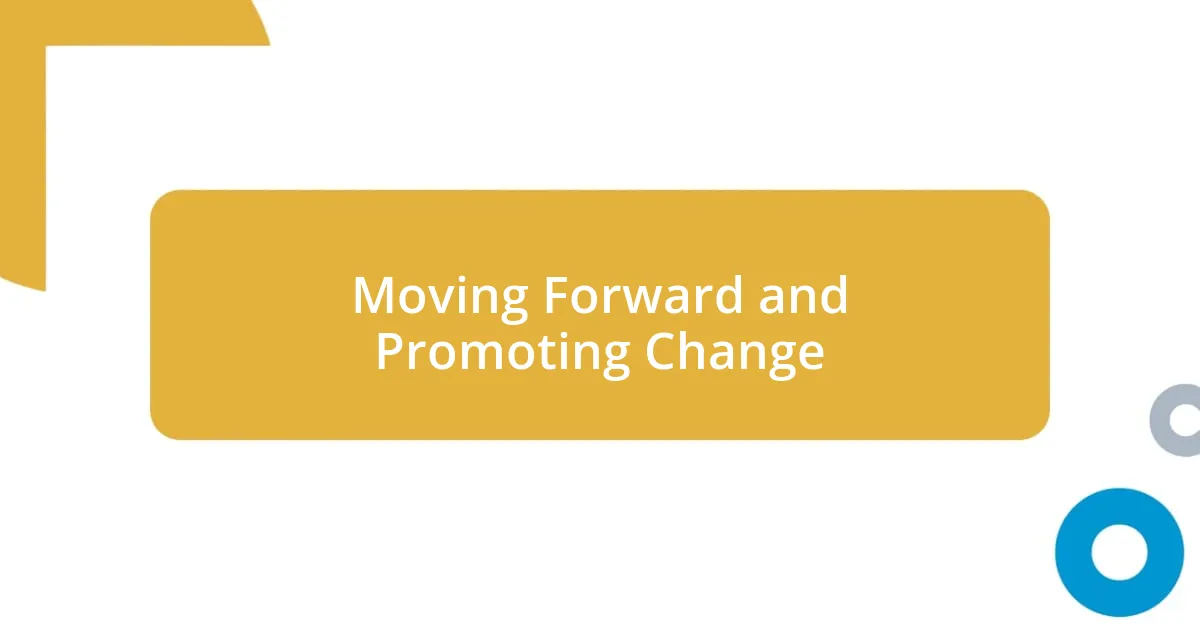
Moving Forward and Promoting Change
Moving forward from discrimination requires a collective effort to foster an inclusive environment. I vividly remember an open community dialogue I attended—it was eye-opening. Listening to various perspectives, I realized how necessary it is to create spaces where everyone feels heard. Have you ever been in a setting where discussions led to real change? It was inspiring to see how powerful conversations can catalyze understanding and reform.
Promoting change also means being proactive. I started organizing workshops at my workplace focused on diversity and inclusion. The initial turnout was modest, but each session sparked meaningful discussions that encouraged empathy among colleagues. Have you considered taking the initiative in your own environment? Even small steps can help shift perspectives and create a more accepting culture.
Lastly, advocacy doesn’t stop with individual efforts; it multiplies when we support each other. I once collaborated with a local charity to host an event that celebrated cultural diversity. Seeing people come together, sharing their stories and traditions, filled me with hope. Isn’t it incredible how unity can transform discriminatory narratives into a celebration of diversity? Encouragement and support from one another often become the bedrock for lasting change.
